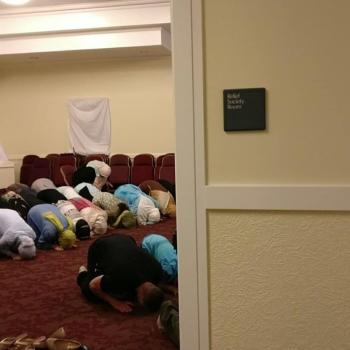
(Wikimedia Commons)
Farid al-Din Attar was a Sufi (that is, a Muslim mystic) who died in the early thirteenth century in what is today Iran and who is widely considered to rank among the greatest of all Sufi writers. The title of his most famous literary work, a lengthy allegorical poem called — in both Arabic and, derivatively, also in Persian — the Mantiq al-Tayr, is typically rendered in English as The Conference of the Birds or else as The Parliament of the Birds. It’s full of little sermonettes and stories and exhortations, subordinate to the overall plot of the story that it relates. (In that regard, I suppose, it’s rather like Geoffrey Chaucer’s Canterbury Tales.) Here are three passages from the Mantiq al-Tayr, as translated from Persian into English for Penguin Classics by
A dog brushed up against a sheikh, who made
No move to draw his skirts in or evade
The filthy stray – a puzzled passer-by
Who’d noticed his behaviour asked him why.
He said: “The dog is filthy, as you see,
But what is outside him is inside me –
What’s clear on him is hidden in my heart;
Why should such close companions stay apart? (151)
To share His hidden glory you must learn
That others errors are not your concern –
When someone else’s failings are defined
What hairs you split – but to your own you’re blind!
Grace comes to those, no matter how they’ve strayed,
Who know their own sin’s strength, and are afraid. (155)
A sot became extremely drunk – his legs
And head sank listless, weighed by wine’s thick dregs.
A sober neighbor put him in a sack
And took him homewards hoisted on his back.
Another drunk went stumbling by the first,
Who woke and stuck his head outside and cursed.
“Hey, you, you lousy dipsomaniac,”
He yelled as he was borne off in the sack,
“If you’d had fewer drinks, just two or three,
You would be walking now as well as me.”
He saw the other’s state but not his own,
And in this blindness he is not alone;
You cannot love, and this is why you seek
To find men vicious, or depraved, or weak –
If you would search for love and persevere
The sins of other men would disappear. (155)
Posted from Seaside, Oregon












